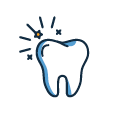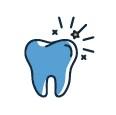The following information, online today, was “last reviewed: May 14, 2019” by the CDC. As one can read, there are no warnings or information for pregnant women, bottle-fed infants, child carers, and others on fluoride’s neurotoxicity. Nor is there any mention of the 63 fluoride IQ studies or the Mother-Offspring fluoride studies. Five references for this article are cited at the end dated 2003, 2012, 2013, 2014. We include this for historical purposes only. (EC)
Children’s Oral Health
Overview
Cavities (also known as caries or tooth decay) are one of the most common chronic diseases of childhood in the United States. Untreated cavities can cause pain and infections that may lead to problems with eating, speaking, playing, and learning. Children who have poor oral health often miss more school and receive lower grades than children who don’t.
- About 1 of 5 (20%) children aged 5 to 11 years have at least one untreated decayed tooth.1
- 1 of 7 (13%) adolescents aged 12 to 19 years have at least one untreated decayed tooth.1
- Children aged 5 to 19 years from low-income families are twice as likely (25%) to have cavities, compared with children from higher-income households (11%).1
The good news is that cavities are preventable. Fluoride varnish can prevent about one-third (33%) of cavities in the primary (baby) teeth.2 Children living in communities with fluoridated tap water have fewer cavities than children whose water is not fluoridated.3 Similarly, children who brush daily with fluoride toothpaste will have fewer cavities.4
Dental sealants can also prevent cavities for many years. Applying dental sealants to the chewing surfaces of the back teeth prevent 80% of cavities.5
What Parents and Caregivers Can Do
For Babies

Wipe gums twice a day with a soft, clean cloth in the morning after the first feeding and right before bed to wipe away bacteria and sugars that can cause cavities.

When teeth come in, start brushing twice a day with a soft, small?bristled toothbrush and plain water.

Visit the dentist by your baby’s first birthday to spot signs of problems early.

Talk to your dentist or doctor about putting fluoride varnish on your child’s teeth as soon as the first tooth appears.
For children younger than 2, consult first with your doctor or dentist regarding the use of fluoride toothpaste.
For Children

Brush their teeth twice a day with fluoride toothpaste.

Drink tap water that contains fluoride.

Ask your child’s dentist to apply dental sealants when appropriate.
If your child is younger than 6, watch them brush.
Make sure they use a pea-sized amount of toothpaste and always spit it out rather than swallow. Help your child brush until they have good brushing skills.
Good Dental Health Is Important for Pregnant Women
When you’re pregnant, you may be more prone to gum disease and cavities, which can affect your baby’s health. Follow these 3 steps to protect your teeth:

See a dentist (it’s safe!) before you deliver

Brush twice a day

Floss Daily
If you have nausea, rinse your mouth with 1 teaspoon of baking soda in a glass of water after you get sick. This helps wash stomach acid away and keep your tooth enamel safe.
Related Links for Health Professionals
- American Academy of Pediatrics Protect Tiny Teeth for Providersexternal icon: an oral health communications toolkit to raise awareness about the importance of oral health during pregnancy
- Community Preventive Service Task Force Recommendations for Improving Oral Health: Preventing Dental Caries (Cavities)external icon
- Oral Health and Learning pdf icon[PDF–81KB]external icon
Related Links for Parents
- American Academy of Pediatrics Protect Tiny Teethexternal icon: Oral Health Tips for Pregnant and New Moms
- American Academy of Pediatrics: Healthychildren.orgexternal icon
- American Academy of Pediatrics: Children’s Oral Health informationexternal icon
- American Academy of Pediatric Dentistry: My Children’s Teethexternal icon
- American Dental Association: Mouth Healthyexternal icon
- Improving Oral Health: Preventing Dental Caries (Cavities)external icon
- Infant Formula and Fluorosis
- Protecting Your Child’s Teeth
- Dental Sealants
- National Institute of Dental and Craniofacial Research’s A Healthy Mouth for Your Babyexternal icon
- Text4Baby: A free cellphone text messaging service for pregnant women and new momsexternal icon that includes oral health messages.
- CDC Kidtastics: Smile
References
- Dye BA, Xianfen L, Beltrán-Aguilar ED. Selected Oral Health Indicators in the United States 2005–2008. NCHS Data Brief, no. 96. Hyattsville, MD: National Center for Health Statistics, Centers for Disease Control and Prevention; 2012.
- Marinho VCC, Worthington HV, Walsh T, Clarkson JE. Fluoride varnishes for preventing dental caries in children and adolescents. Cochrane Database of Systematic Reviews. 2013; Issue 7. Art. No.: CD002279. DOI: 10.1002/14651858.CD002279.pub2.
- Community Preventive Services Task Force. Preventing Dental Caries: Community Water Fluoridation website. https://www.thecommunityguide.org/findings/dental-caries-cavities-community-water-fluoridationexternal icon. Accessed October 23, 2014.
- Marinho VCC, Higgins JPT, Logan S, Sheiham A. Fluoride toothpastes for preventing dental caries in children and adolescents. Cochrane Database of Systematic Reviews. 2003; Issue 1. Art. No.: CD002278. DOI: 10.1002/14651858.CD002278.
- Ahovuo-Saloranta A, Forss H, Walsh T, Hiiri A, Nordblad A, Mäkelä M, Worthington HV. Sealants for preventing dental decay in the permanent teeth. Cochrane Database of Systematic Reviews. 2013; Issue 3. Art. No.: CD001830. DOI: 10.1002/14651858.CD001830.pub4.
Page last reviewed: May 14, 2019
